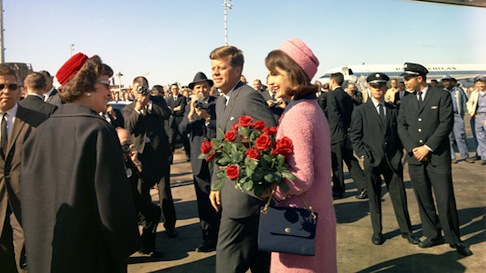Latest Kennedy assassination rewind retains a firm grip
11/23/09 10:35 AM

By ED BARK
Here we go again. Not that we shouldn't.
National Geographic Channel's The Lost JFK Tapes: The Assassination is the latest anniversary-tied re-telling of that very dark day in Dallas.
Premiering one day removed from the 46th anniversary of President Kennedy's last day, it's two hours shorter than History Channel's two-part, four-hour JFK: 3 Shots That Changed America, which aired in early October as part of that network's "Kennedy DeClassified Week."
Lost JFK Tapes (8 p.m. central Monday) is more closely tied to local TV coverage, with WFAA8 getting the lion's share of exposure. Program director Jay Watson once again is center stage, exhaling a cloud of cigarette smoke before interviewing the soon-to-be-famous Abraham Zapruder live in the station's studios.
WFAA8 news director Bob Walker, who died on July 7 of this year, is more than a bit player this time, though. He has a phone at each ear during one evocative live shot.
Later in the film, Walker looks irked when an unidentified WFAA8 underling comes on camera to quietly deliver the news that Jack Ruby reportedly is the shooter of Lee Harvey Oswald. Walker impulsively covers a desk top microphone with his hand, apparently worried that the man might not know what he's talking about. But he did, of course.
Lost JFK Tapes, compiled in cooperation with The Sixth Floor Museum at Dealey Plaza, includes faulty reporting as well. As during 3 Shots That Changed America, KRLD-TV reporter Bob Huffaker repeatedly refers to Oswald as "Lee Harold Oswald," unable to get the name right even during the minutes after Ruby killed him. Another unidentified reporter twice calls him "Harvey Lee Oswald" well after he had been arrested and correctly identified by police.
Most jarring of all, though, is a local TV reporter (again off-camera and unidentified) telling viewers, "The report is that the attempted assassins, we now hear it was a man and a woman who fired the shots were on the ledge of a building near the Houston Street underpass."
Lost Tapes -- even if the title's a misnomer -- recounts the tragedy in chronological order without narration. Watson, who died in 2001, is clearly local television's man of the hour as the story unfolds at a rapid clip. Eyewitnesses and station staffers, including Jerry "Mr. Peppermint" Haynes, are paraded in and out while Watson smokes, commiserates, tries to stay composed and at one point tells viewers, "We are ashamed at the moment. We are stunned."
For younger and older generations alike, it's a story that will never lose its power. Transfixing, horrific, heart-breaking and irreversible.
GRADE: A-minus
